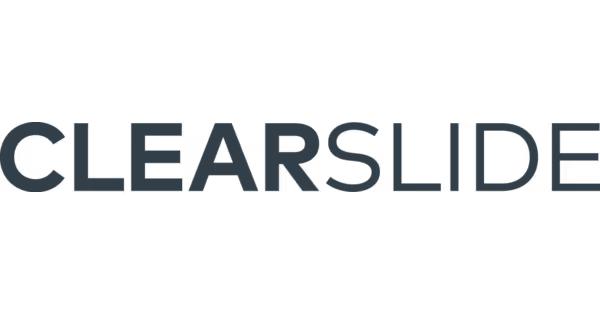Lantern Alternatives
Find your Lantern alternative. This guide compares 10 options, reviewing features, use cases, and pricing to help you make the right choice.

You might know Lantern for its quality website development. Users praise its clear communication and reliable support. It is a solid partner to help build and maintain an online presence, especially for brands that have ambitious ideas.
Still, any service has its limits. With few public reviews and no listed pricing, some teams may hesitate to commit. We analyzed top alternatives based on G2 reviews and compared their features against Lantern to help your search. Let's get started.
Consider 11x for Digital Sales Workers
For teams that want to add digital workers for sales, 11x is a relevant option. The platform provides autonomous agents built to handle parts of the sales process. This can be a fit for companies that want to expand their outreach capabilities.
11x is a GTM platform with AI agents for the sales process. Alice finds prospects and handles outreach, while Julian qualifies leads and books meetings. It unifies data enrichment and outreach tools, replacing separate solutions in a GTM stack.
Lantern Alternatives
The following sections break down each Lantern alternative in detail. We compare core features, pricing, and the potential advantages or drawbacks of each service against Lantern.
1) Similarweb
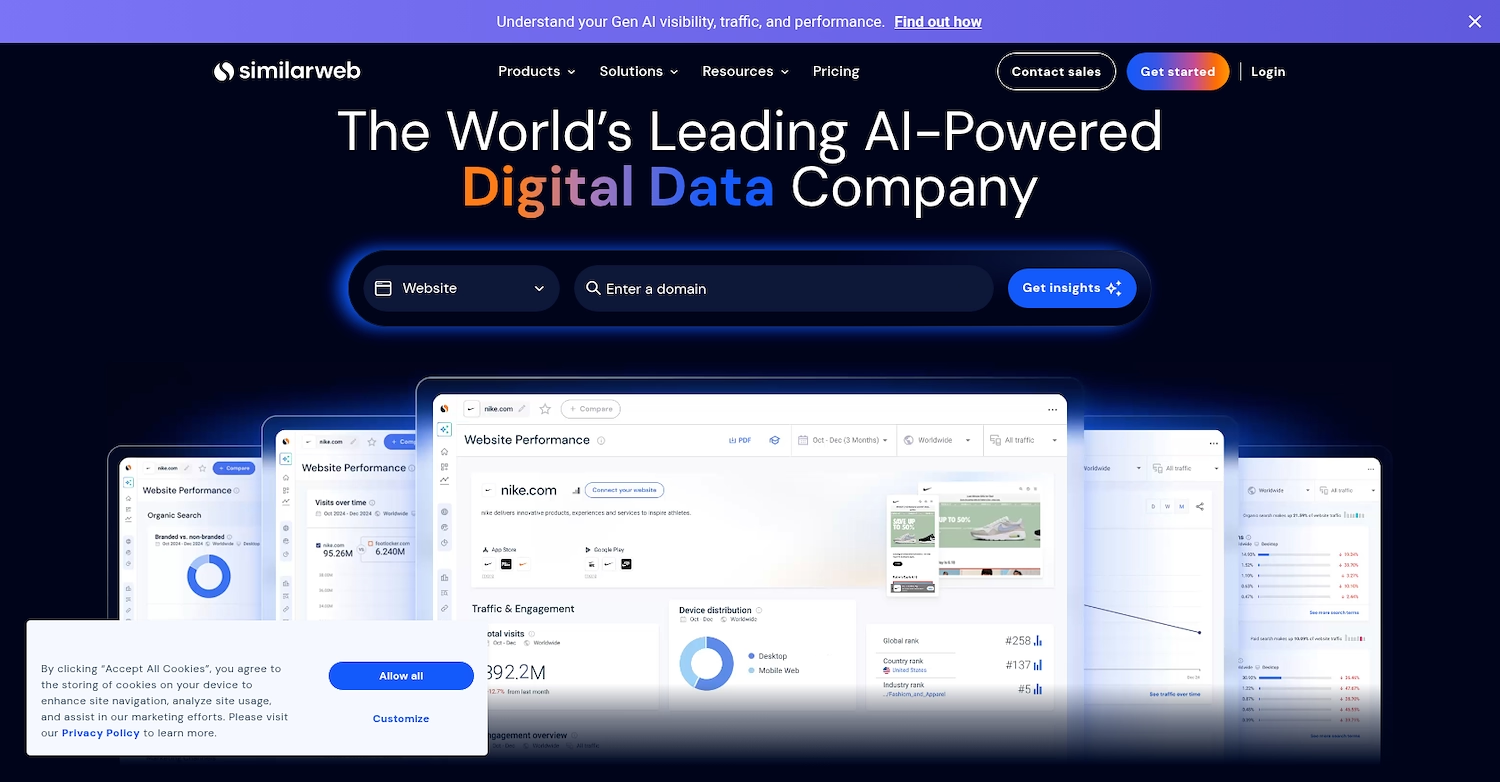
Similarweb is a digital intelligence platform that provides data on website traffic and performance. Businesses use this information for competitive analysis and to understand market trends. The data can support revenue intelligence strategies for executive teams.
It also reveals market shifts that may signal job changes at other companies. This information helps sales and marketing teams identify new opportunities and potential leads.
Similarweb's Main Features
- Provides data on website traffic and performance for digital intelligence.
- Offers competitive analysis tools to understand market trends.
- Supports revenue intelligence strategies for executive teams.
- Identifies market shifts and job changes to find new sales opportunities.
How Similarweb Compares to Lantern
Average Review Score: 4.5/5 stars based on 985 G2 reviews.
- Similarweb provides broad market and competitor traffic data, while Lantern focuses on building and maintaining a single website.
- The tool offers digital intelligence across 1 billion websites and 8 million apps, a scale of data analysis not available with Lantern's web development services.
- It helps teams perform competitive analysis and identify market trends. This is different from Lantern, which provides website creation and support.
- The platform includes specific tools for SEO, paid search, and advertising intelligence. Lantern's service centers on website development rather than these analytics functions.
Potential Drawbacks Compared to Lantern
- Similarweb provides website data but does not offer website creation services, which is a core part of Lantern's service.
- The platform focuses on analytics and lacks the hands-on website maintenance and technical support that Lantern provides.
- It is a self-service data tool, unlike Lantern, which acts as a development partner with dedicated project support.
- Some users note its data can be inaccurate at times, a type of issue not applicable to Lantern's service-based model.
Pricing and Cost-Effectiveness
Lantern does not list public pricing, providing custom quotes for its web development services. In contrast, Similarweb uses a subscription model, with its Starter plan at $125 per month and its Professional plan at $333 per month.
2) Semrush
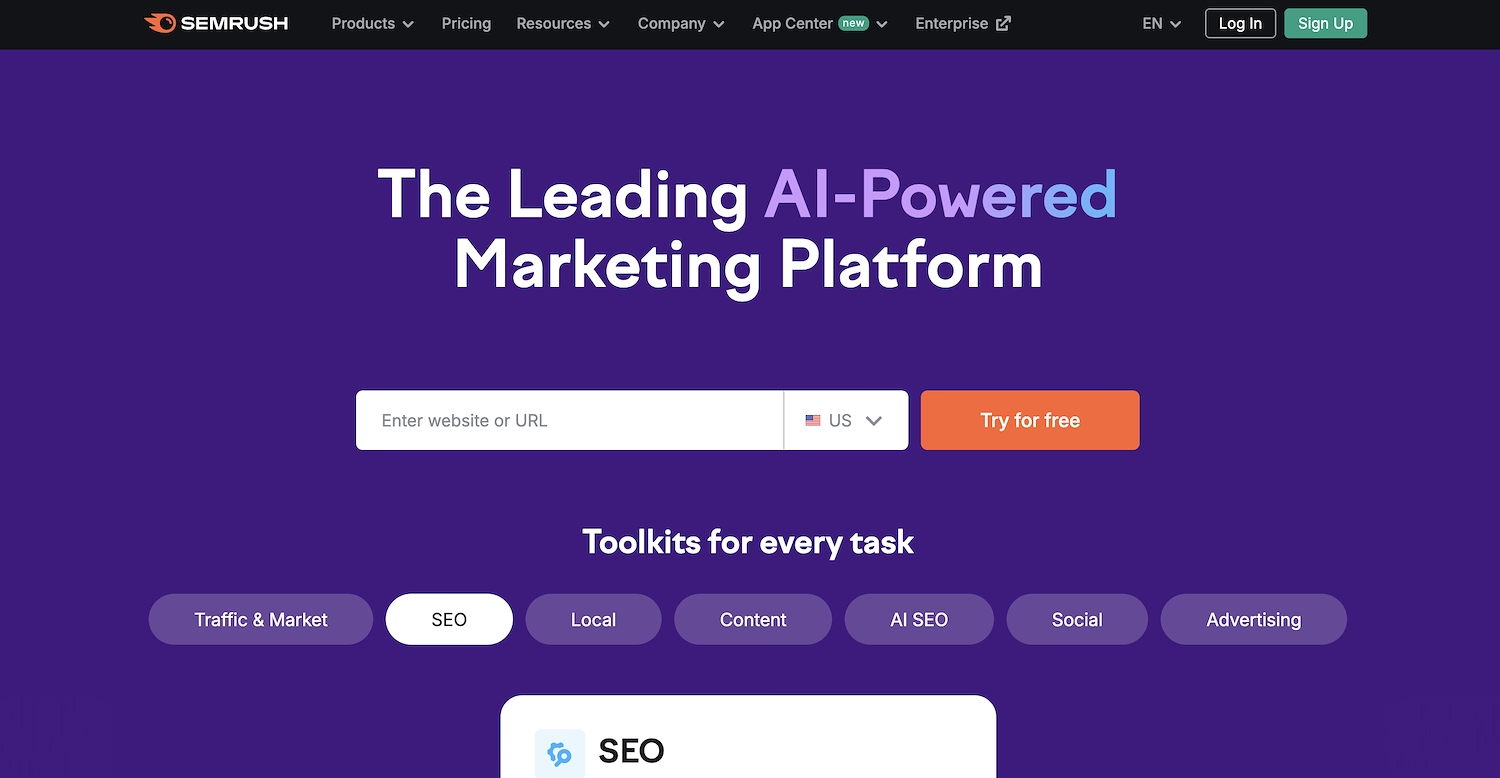
Semrush is a marketing platform that uses AI to consolidate SEO, competitive intelligence, and market research tools. Businesses use it to benchmark a site’s traffic and market share before they plan campaigns. It provides insights from a large marketing database.
The platform helps identify keyword gaps and analyze competitor ad spend patterns. It also has tools for content, advertising, and social media management within one interface.
Semrush's Main Features
- Consolidates SEO, competitive intelligence, content, and advertising capabilities into a single interface.
- Offers AI-enabled toolkits for SEO that discover keywords and analyze backlink profiles.
- Includes content tools that generate SEO-ready articles with AI and score copy in real time.
- Features an advertising suite to launch AI-powered ads and uncover competitor ad strategies.
How Semrush Compares to Lantern
Average Review Score: 4.5/5 stars based on 2,689 G2 reviews.
- Semrush offers a complete SEO toolkit for keyword research and SERP rank tracking, which are analytics functions not included in Lantern's web development service.
- It includes competitive intelligence features to analyze competitor ad spend and market share. This is different from Lantern, which focuses on building and maintaining a single brand's website.
- The platform provides AI tools to generate SEO-ready content and score copy. Lantern builds the website's framework but does not offer these content creation services.
- This tool offers specific features for link building and backlink profile analysis. Lantern's service centers on website creation and technical support, not off-page SEO tasks.
Potential Drawbacks Compared to Lantern
- Semrush provides data and analytics but does not offer website creation services. This is different from Lantern, which specializes in building custom websites for brands.
- The tool is a self-service platform, and some users note a learning curve. It lacks the dedicated project support and hands-on technical maintenance that Lantern provides.
- It operates as a software-as-a-service tool for marketing analytics. This contrasts with Lantern's model, which functions as a service partner for website development.
- Semrush's subscription plans can be expensive for access to its data tools. Lantern provides custom quotes for a specific project, which might be more predictable for a website build.
Pricing and Cost-Effectiveness
Lantern provides custom quotes for its project-based services, while Semrush uses a subscription model with plans starting at $139.94 per month. Lantern's model may be more cost-effective for a single website build, whereas Semrush's recurring fee is designed for ongoing marketing analytics. For detailed tier information, visit Semrush's official website.
3) Ahrefs
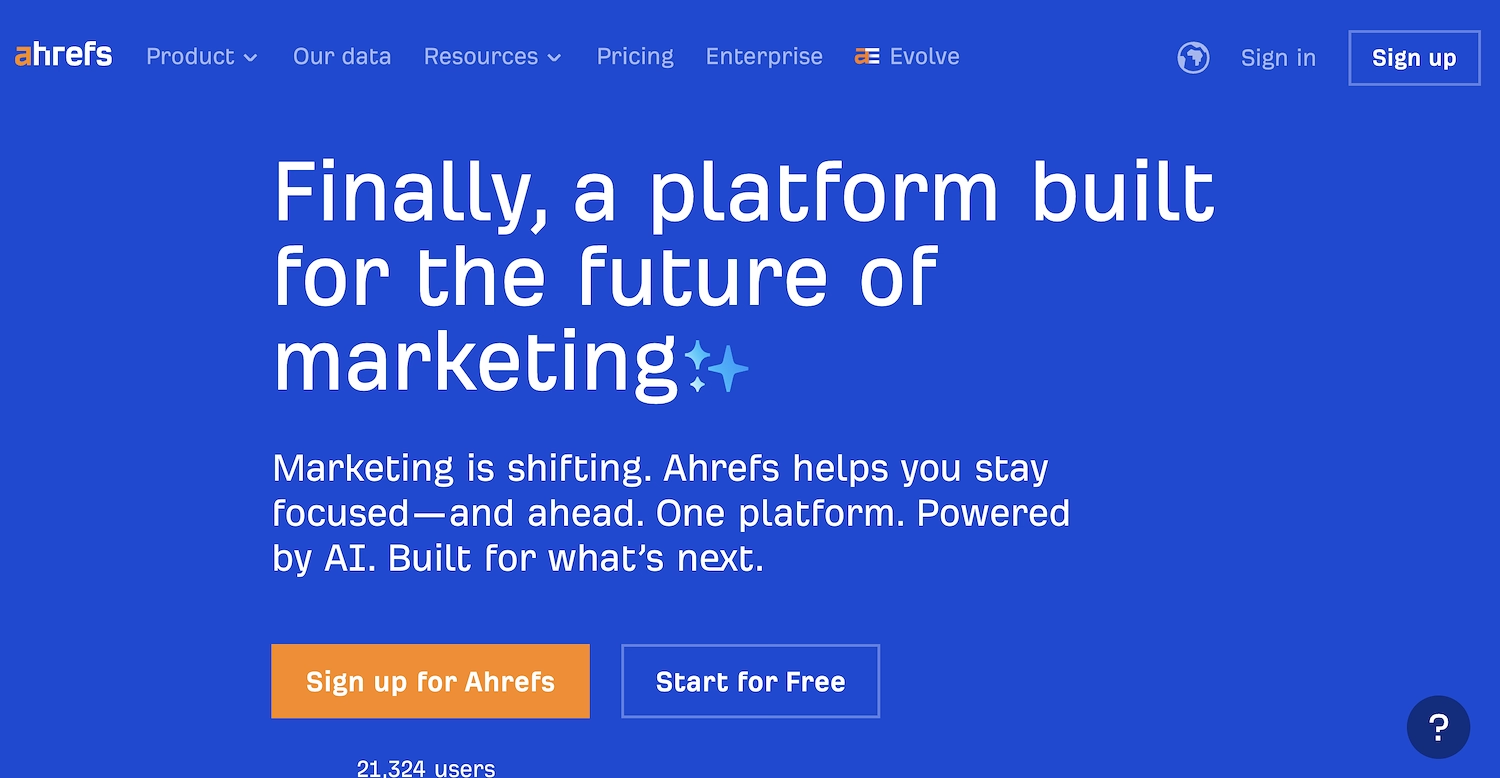
Ahrefs is a marketing platform that consolidates SEO, content, and paid-search tools. Businesses use it for market intelligence to track competitor positions and market shifts, which helps inform go-to-market strategies. It also benchmarks competitor ads to surface high-intent keywords that can improve return on ad spend.
Ahrefs's Main Features
- Analyzes competitor websites, backlinks, PPC ads, and traffic using the Site Explorer tool.
- Generates and evaluates content with an AI helper and discovers topics with the Keywords Explorer.
- Monitors website health 24/7 and provides automated technical fixes through its Site Audit feature.
- Tracks brand mentions and sentiment across AI chatbots and search engines with Brand Radar.
How Ahrefs Compares to Lantern
Average Review Score: 4.5/5 stars based on 583 G2 reviews.
- Ahrefs offers an automated Site Audit feature that monitors website health 24/7. This is different from Lantern, which provides hands-on technical support for a website.
- The platform's Keywords Explorer gives access to data on over 110 billion keywords. This provides market insights not available through Lantern's website creation services.
- Its Site Explorer tool analyzes competitor backlinks and PPC ads. This is a competitive intelligence function, while Lantern focuses on building and maintaining a single website.
- The tool also features a large backlink index with over 35 trillion links for analysis. This is a specialized SEO function, unlike Lantern's service which centers on web development.
Potential Drawbacks Compared to Lantern
- Ahrefs provides tools to analyze a website but does not offer creation or design services. This is different from Lantern, which acts as a partner to build a custom website for a brand.
- It operates as a self-service software, which some beginners find overwhelming due to the amount of data. This model contrasts with Lantern's service, which includes direct support and partnership on a web project.
- Some users find the subscription pricing high, especially for smaller teams with limited project slots. Lantern offers custom quotes for a specific web development project, which can be a more predictable one-time cost.
- The platform delivers data and analytics about website performance but does not implement the changes itself. Lantern, in contrast, is a service that directly builds and maintains the website for a client.
Pricing and Cost-Effectiveness
Lantern provides custom quotes for its project-based services, while Ahrefs uses a subscription model with paid plans starting at $29 per month. Lantern's model may be more cost-effective for a one-time website build, whereas Ahrefs' recurring fee is designed for ongoing marketing analytics. For detailed pricing, visit Ahrefs's official website.
4) SpyFu
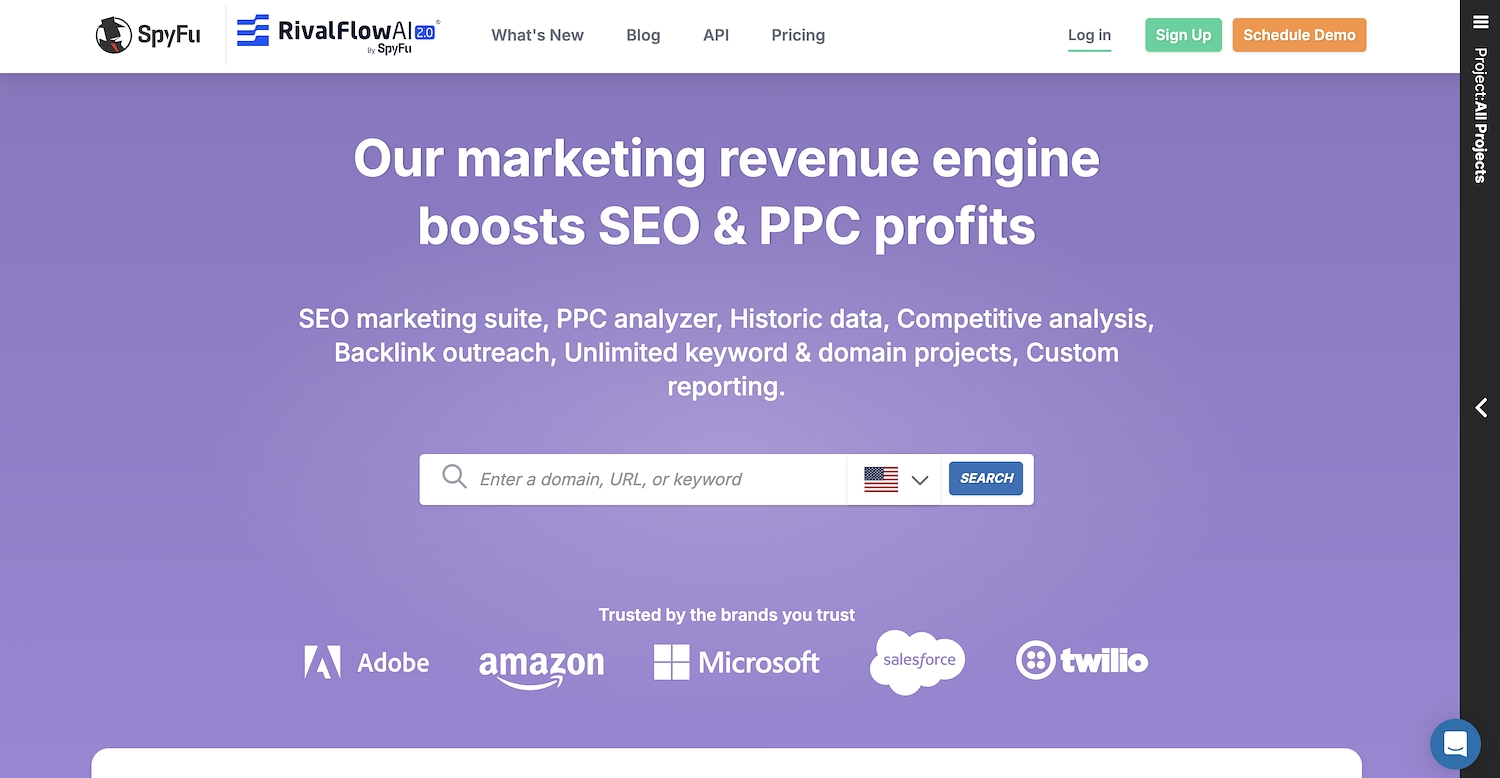
SpyFu is a competitive intelligence platform for search marketing. It exposes the keywords that competitors buy on Google Ads and tracks their organic ranking history. Companies use this information to uncover profitable search strategies and inform their own campaigns, which can support revenue goals.
SpyFu's Main Features
- It uncovers competitors’ Google Ads keywords and provides buy-keyword recommendations.
- The platform provides access to a 14-year archive of ranking history, keywords, and backlinks for any domain.
- Its RivalFlow AI tool detects content gaps and autogenerates copy to improve SEO rankings.
How SpyFu Compares to Lantern
Average Review Score: 4.6/5 stars based on 513 G2 reviews.
- SpyFu reveals the exact keywords competitors buy on Google Ads, an analytics feature not part of Lantern's web development service.
- It provides access to over 19 years of ranking history for any domain, offering long-term trend analysis that differs from Lantern's project-based website support.
- The platform offers deep keyword research to find profitable terms for campaigns, a function that is more specialized than the technical SEO setup included in Lantern's services.
- Its RivalFlow AI tool identifies content gaps on a website and generates copy to improve rankings, an automated content feature that Lantern does not provide.
Potential Drawbacks Compared to Lantern
- SpyFu provides data for website optimization but does not offer website creation services, which is Lantern's primary function.
- The tool is a self-service platform. This is different from Lantern, which acts as a development partner with dedicated project support.
- It identifies SEO opportunities but does not implement the technical changes. Lantern, in contrast, handles the direct build and maintenance of a website.
Pricing and Cost-Effectiveness
Lantern provides custom quotes for its project-based services, while SpyFu uses a subscription model with plans starting at $39 per month. Lantern's model may be more cost-effective for a single website build, whereas SpyFu's recurring fee is designed for ongoing search marketing analysis. For detailed pricing, visit SpyFu's official website.
5) Crayon
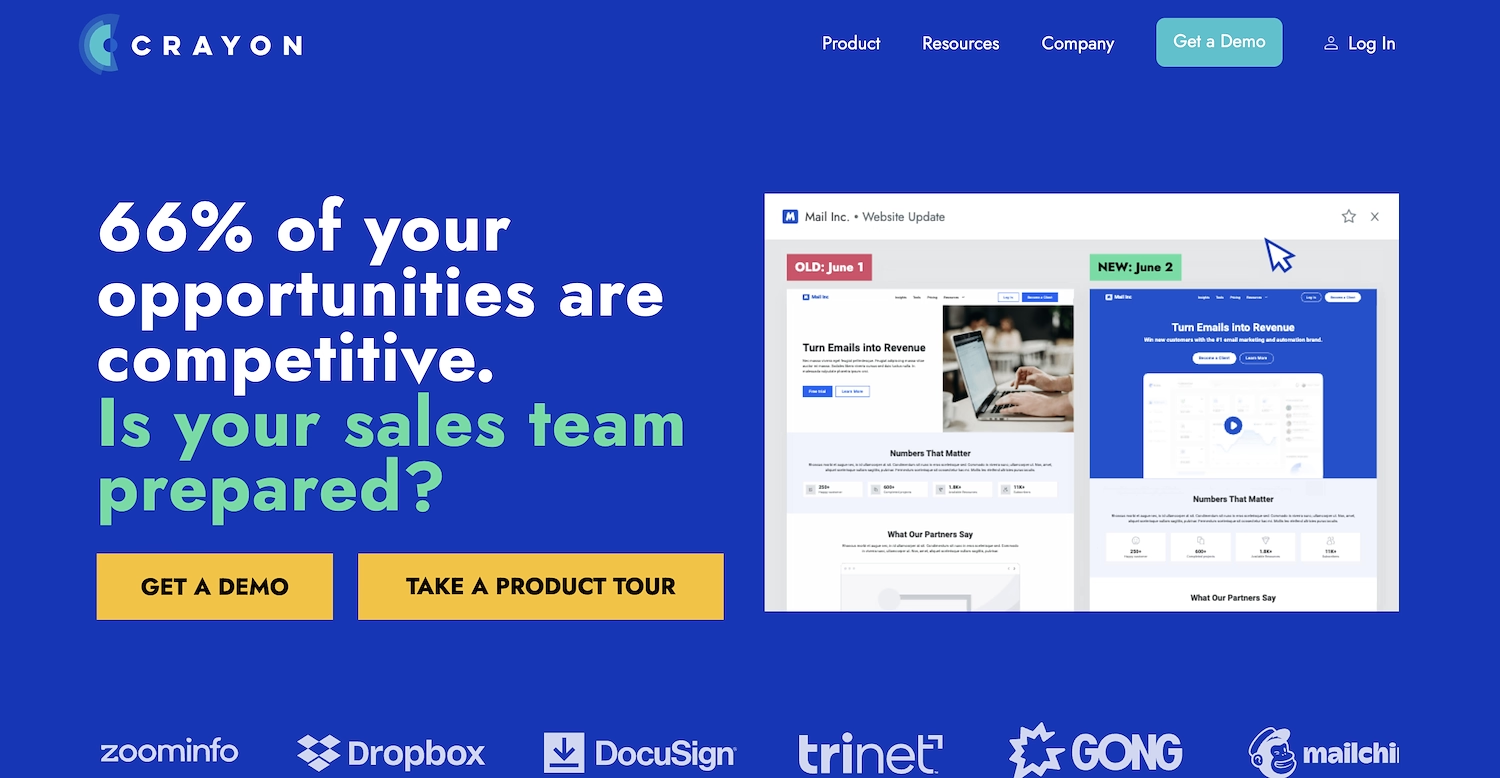
Crayon is a competitive intelligence platform that automates the collection of market and competitor data. Businesses use the software to inform their revenue intelligence strategy. The platform also tracks external signals like job changes at other companies, which can reveal new sales or partnership opportunities.
Crayon's Main Features
- Automates competitor monitoring and delivers daily intel digests with AI-summarized takeaways.
- Creates and deploys competitive assets like battlecards directly within tools such as Salesforce and Slack.
- Provides sales teams with contextual intelligence and tracks performance through competitive win-rate leaderboards.
- Measures the impact of competitive intelligence on revenue through win/loss analysis and engagement analytics.
How Crayon Compares to Lantern
Average Review Score: 4.6/5 stars based on 384 G2 reviews.
- Crayon automates competitor monitoring and delivers daily intel digests with AI summaries. This provides ongoing market insights, which is different from Lantern's project-based website support.
- It creates and deploys competitive assets like battlecards directly into sales tools such as Salesforce. Lantern builds the website itself but does not offer these specific sales enablement features.
- The platform measures the impact of competitive intelligence on revenue through win/loss analysis. This is a data analytics function, while Lantern focuses on the technical creation of a website.
- This tool provides a centralized platform to track competitor product details and customer feedback. Lantern acts as a development partner, not as software for ongoing data collection.
Potential Drawbacks Compared to Lantern
- Crayon provides market data but does not build or design websites. Lantern, in contrast, is a service partner that handles the entire website creation process.
- The platform is a self-service tool, and some users report a difficult setup. This differs from Lantern's model, which includes dedicated project support from the start.
- It delivers competitive intelligence but does not implement website changes. Lantern directly builds and maintains the website, handling the technical execution for its clients.
Pricing and Cost-Effectiveness
Lantern provides custom quotes for its project-based services, and Crayon also requires contacting the vendor for a quote. For the most accurate and up-to-date pricing information, we recommend visiting Crayon's official website.
Top Pick for Sales Automation: 11x
Companies that want to add digital workers to their sales process will find 11x a focused solution. Its autonomous agents handle outreach and lead qualification. This platform is a relevant option for teams that want to expand sales capabilities without adding headcount.
With 11x, we use AI to run our sales playbook. Alice finds accounts, enriches data, and handles outreach. Julian qualifies leads on calls and books meetings. The platform unifies the GTM stack, replacing separate tools for data and outreach without new hires.
Book a demo to see the platform in action.
6) Klue
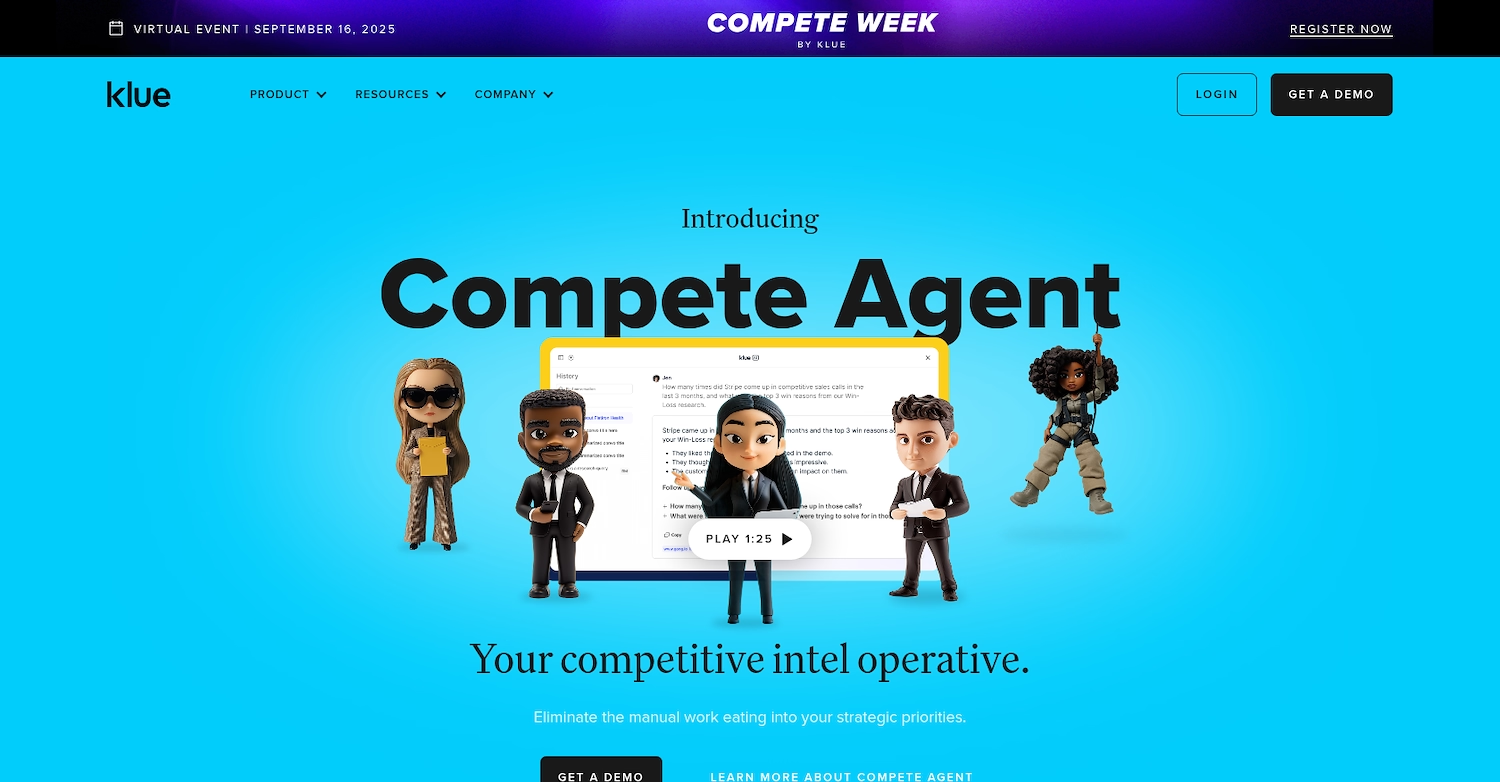
Klue is a competitive intelligence platform that helps companies collect and organize competitor data. Businesses use it to inform revenue intelligence strategies. The platform also tracks market signals, such as job changes, that can point to new sales opportunities.
Klue's Main Features
- Delivers real-time competitive intelligence to sellers and auto-generates battle-cards using an AI agent.
- Conducts and analyzes buyer interviews to find reasons for wins, losses, and churn.
- Retrieves and delivers intel inside existing tools like CRM and communication suites.
- Automatically collects and curates competitor content to build and maintain profiles.
How Klue Compares to Lantern
Average Review Score: 4.7/5 stars based on 440 G2 reviews.
- Klue uses an AI agent to auto-generate battlecards for sales teams. This is different from Lantern, which focuses on the technical development of a website.
- The platform delivers competitive intel directly into tools like Salesforce and Slack. Lantern is a service for building websites and does not offer these software integrations.
- It analyzes buyer interviews to provide insights on sales wins and losses. In contrast, Lantern's service centers on website creation rather than sales performance analysis.
- This tool automatically collects and organizes competitor information into a central platform. Lantern operates as a service partner for web development, not as a data collection software.
Potential Drawbacks Compared to Lantern
- Klue provides competitive data but does not offer website creation or design. This is different from Lantern, which acts as a service partner to build a custom website for a brand.
- It operates as a self-service software tool. This model lacks the dedicated project support and hands-on technical maintenance that are part of Lantern's service.
- Some users note a slow implementation process. This contrasts with Lantern's direct service model, which handles the web project without requiring internal teams to adopt a new platform.
Pricing and Cost-Effectiveness
Lantern provides custom quotes for its project-based services, and Klue also requires contacting the vendor for a quote. For the most accurate and up-to-date pricing information, we recommend visiting Klue's official website.
7) Crunchbase
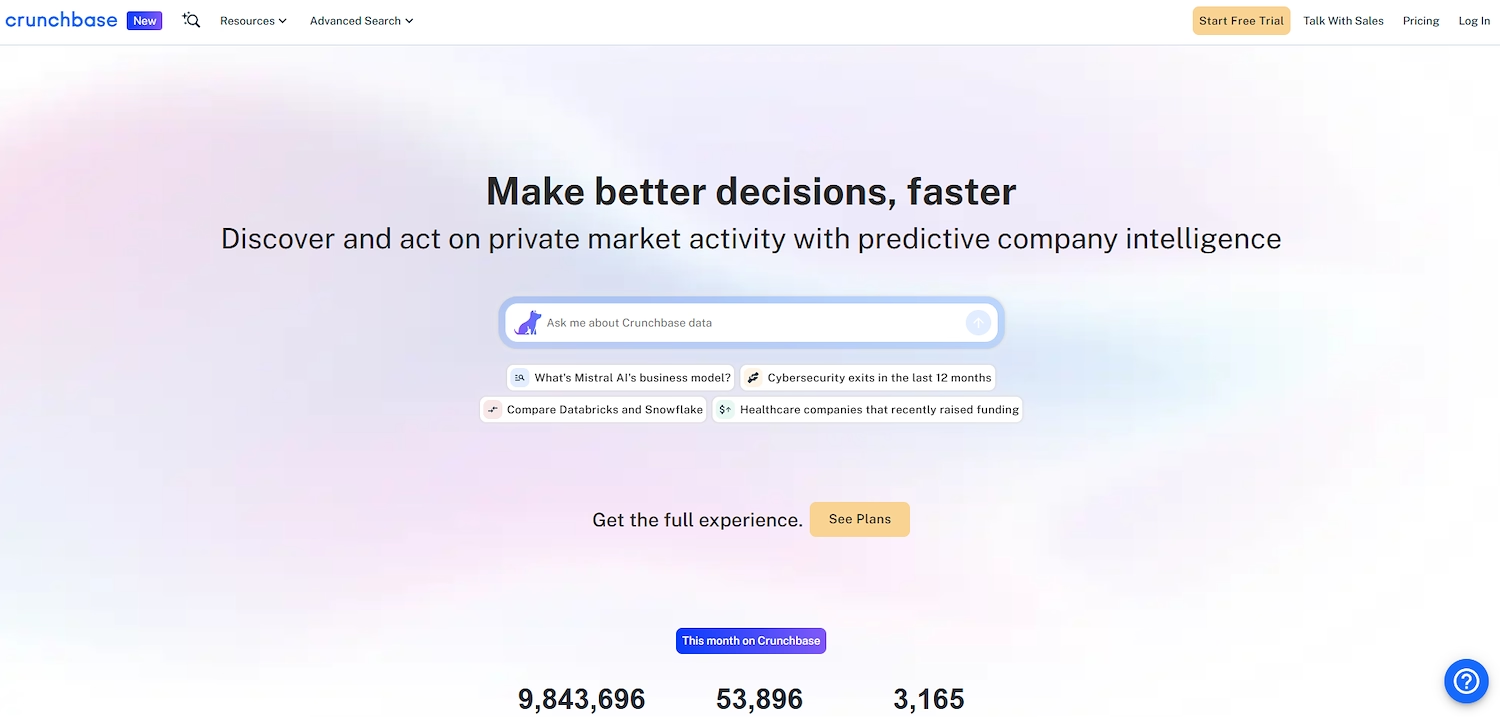
Crunchbase is a business information platform that provides data on private and public companies. Teams use it to find prospects and track market trends. The service supports revenue intelligence with details on company funding and leadership. It also tracks job changes, which can signal new sales opportunities at key accounts. This information helps users discover and qualify potential leads.
Crunchbase's Main Features
- Provides algorithmic predictions on company events, including IPO likelihood, funding rounds, and leadership hires.
- Filters companies, people, investors, and funding rounds with an advanced search function.
- Surfaces notable events across companies through continually updated insight feeds.
- Assists with research tasks using an AI-driven helper called Crunchbase Scout.
How Crunchbase Compares to Lantern
Average Review Score: 4.5/5 stars based on 377 G2 reviews.
- Crunchbase offers algorithmic predictions for company events like IPOs and funding rounds, a data analysis feature not available with Lantern's web development services.
- It includes an advanced search function to filter companies and investors. This is different from Lantern, which focuses on building a single website rather than providing a research database.
- The platform uses an AI helper, Crunchbase Scout, to assist with research tasks. This is a self-service research tool, unlike Lantern's model which provides direct development partnership.
- This tool provides access to a large database of company and contact information for prospecting. Lantern, in contrast, is a service that builds a website, not a platform for lead generation data.
Potential Drawbacks Compared to Lantern
- Crunchbase provides business data but offers no website creation services. Lantern, in contrast, is a development partner that builds and designs custom websites for brands.
- The platform operates as a self-service tool for research. This model differs from Lantern's, which includes direct project support and hands-on technical maintenance for a website.
- While the tool provides data to find opportunities, it does not implement any website changes. Lantern, on the other hand, handles the direct build and maintenance of a website for its clients.
- Some users report that company data on the platform can be incomplete. This type of data accuracy issue is not applicable to Lantern's service-based web development model.
Pricing and Cost-Effectiveness
Lantern provides custom quotes for its project-based services, while Crunchbase uses a subscription model with its Pro plan starting at $99 per month. Lantern's model may be more cost-effective for a single website build, whereas Crunchbase's recurring fee is designed for ongoing business data research.
8) Mixpanel
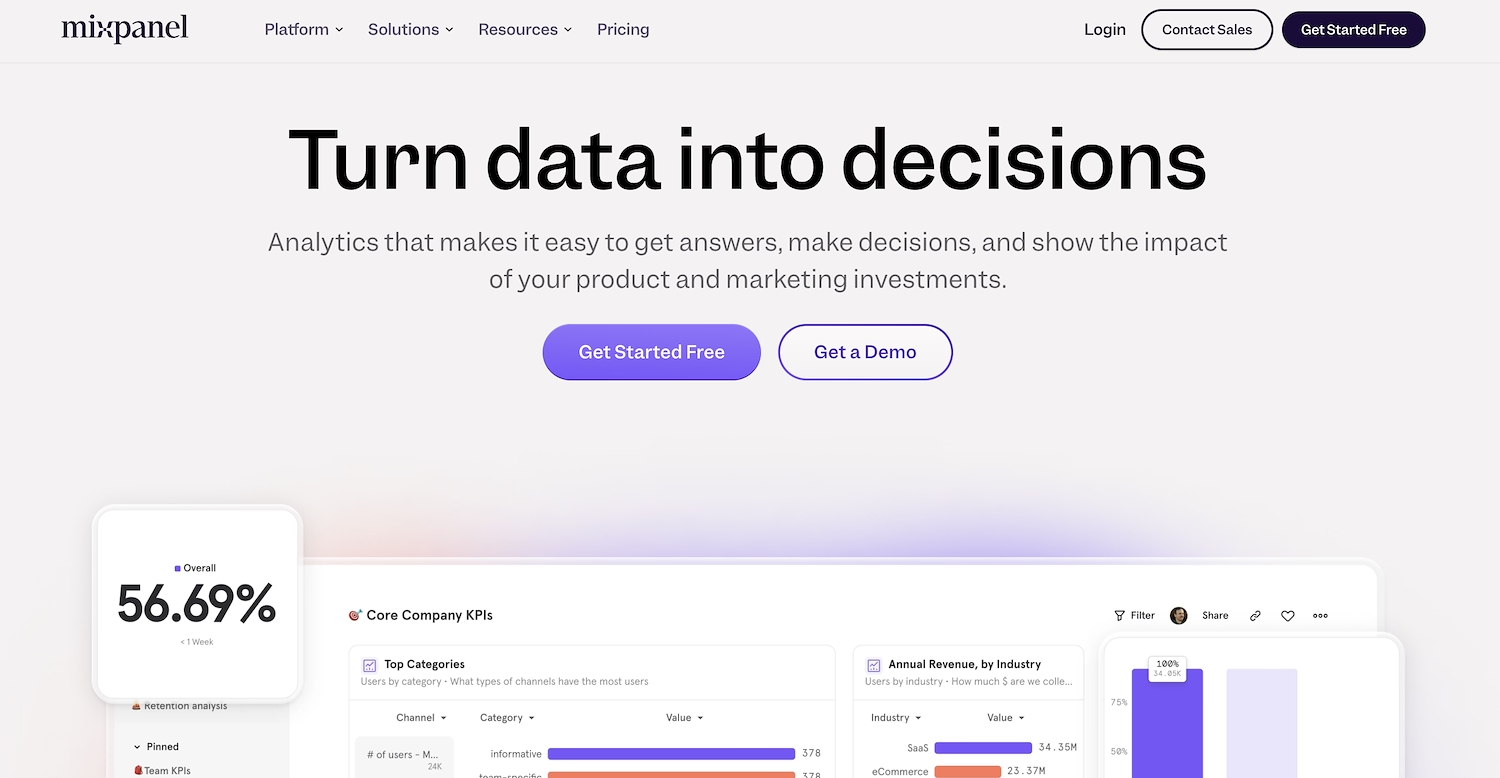
Mixpanel is a product analytics platform that shows how users behave in an application. Companies use it to track product usage, analyze conversion funnels, and measure retention. These insights support data-informed decisions for product improvements, which can directly influence revenue and growth.
Mixpanel's Main Features
- Tracks user behavior through standard and custom event tracking to understand product usage.
- Creates custom reports and dashboards to analyze user funnels, cohorts, and retention.
- Segments users to provide insights for product, marketing, and growth teams.
- Analyzes user engagement data to help teams make data-informed decisions.
How Mixpanel Compares to Lantern
Average Review Score: 4.6/5 stars based on 1,167 G2 reviews.
- Mixpanel provides detailed user behavior analytics through custom event tracking. This is different from Lantern, which focuses on the website's initial build and ongoing maintenance.
- It creates custom reports and dashboards to analyze user funnels and retention. This offers product insights not available through Lantern's web development services.
- The platform segments users to provide specific data for product and marketing teams. In contrast, Lantern acts as a service partner to build the website itself, not to analyze its user base.
- This tool includes an AI Copilot to assist with research and analytics tasks. This is a self-service feature, unlike the direct, hands-on development support that Lantern provides.
Potential Drawbacks Compared to Lantern
- Mixpanel does not build or design websites for brands. This is different from Lantern, which acts as a service partner to handle the entire website creation process.
- The platform is a self-service tool, and some users note a steep learning curve for its advanced features. This model contrasts with Lantern, which provides direct project support and development partnership.
- It delivers data on user behavior but does not implement the technical changes itself. Lantern, in contrast, handles the direct build and maintenance of a website for its clients.
- Some users report that the tool's pricing can become expensive as event volume scales. This is different from Lantern's project-based quotes, which may be more predictable for a one-time website build.
Pricing and Cost-Effectiveness
Lantern provides custom quotes for its project-based services, while Mixpanel uses a subscription model with a free plan and a Growth plan starting at $0 per month that scales with usage. Lantern's model may be more cost-effective for a single website build, whereas Mixpanel's recurring fee is designed for ongoing product analytics. For detailed pricing, visit Mixpanel's official website.
9) Amplitude
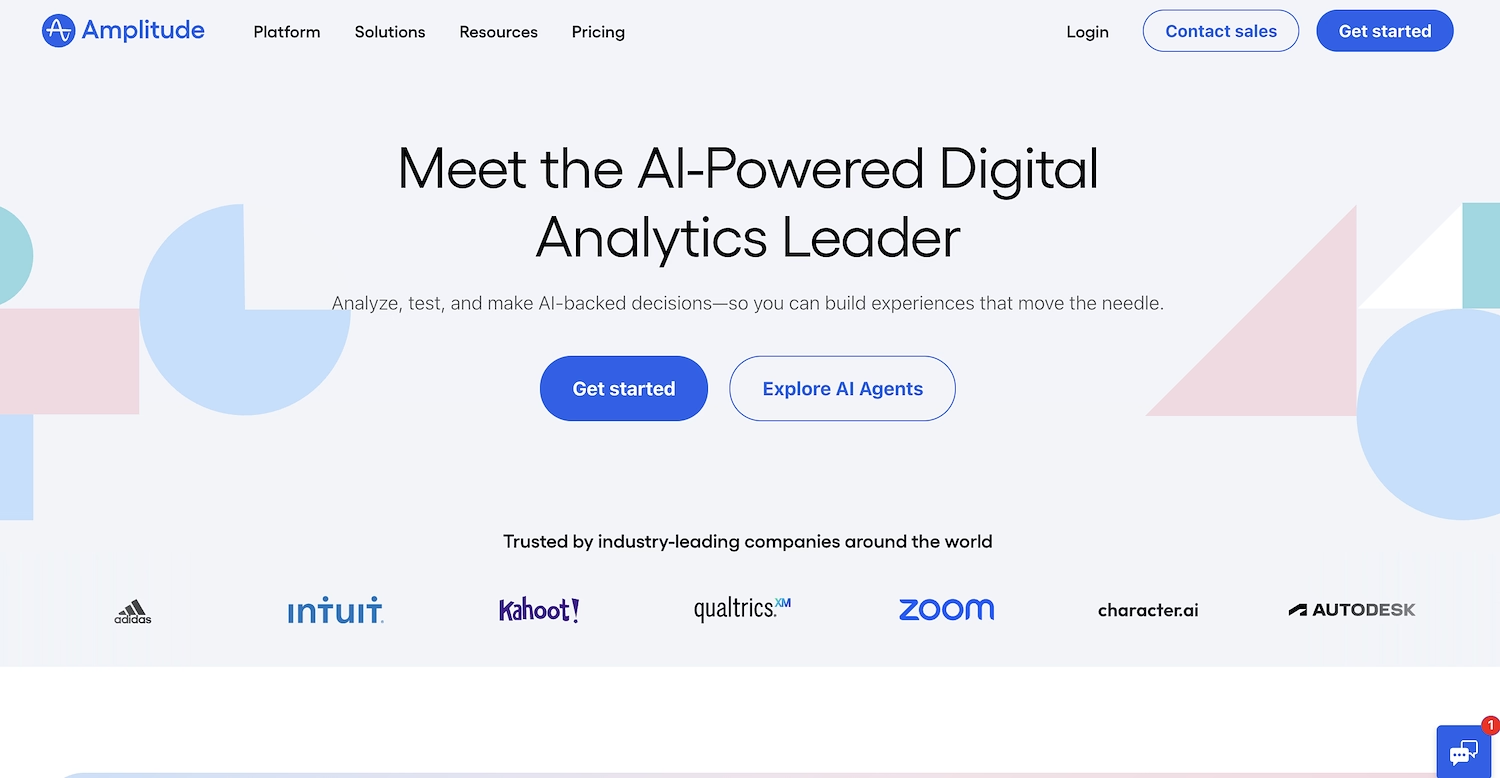
Amplitude is a digital analytics platform that provides insight into user behavior. Companies use its data to see how customers interact with their products. This information supports product improvements and can inform revenue strategy.
The platform offers a clear view of the customer journey. Teams use this to identify points to improve conversion and retention, which can impact revenue growth.
Amplitude's Main Features
- Tracks user behavior with custom event tracking to understand product usage.
- Manages user permissions through role and access controls for administrative purposes.
- Segments users into groups to provide specific insights for analysis.
- Provides real-time insights and custom dashboards for tracking and reporting on user activity.
How Amplitude Compares to Lantern
Average Review Score: 4.5/5 stars based on 2,405 G2 reviews.
- Amplitude tracks specific user actions with custom event tracking, offering a level of user behavior analysis not found in Lantern's web development service.
- It groups users into segments for targeted analysis, while Lantern builds the website for all users but does not offer tools to analyze specific audience groups.
- The platform provides real-time insights on custom dashboards to monitor user activity as it happens, which differs from Lantern's focus on development support.
- This tool includes user and role management to control access to analytics data. Lantern operates as a service partner and does not have a comparable platform-based access system.
Potential Drawbacks Compared to Lantern
- Amplitude provides data on user behavior but does not offer website creation or design services. This is different from Lantern, which acts as a partner to build a custom website for a brand.
- The platform is a self-service tool, and some users report a steep learning curve. It lacks the dedicated project support and hands-on technical maintenance that Lantern provides.
- It delivers analytics to find opportunities but does not implement any website changes. Lantern, in contrast, handles the direct build and maintenance of a website for its clients.
Pricing and Cost-Effectiveness
Lantern provides custom quotes for its project-based services, while Amplitude uses a subscription model with a free plan and a pay-as-you-go option. Lantern's model may be more cost-effective for a single website build, whereas Amplitude's recurring fee is designed for ongoing product analytics. For detailed pricing, visit Amplitude's official website.
10) Pendo
Pendo is a product experience platform that provides analytics and in-app guidance. Companies use it to understand user behavior and improve product adoption. This information helps teams make informed decisions about feature development and user onboarding.
The platform helps identify where users struggle and guides them with in-app messages. This can increase user retention and support growth objectives.
Pendo's Main Features
- Analyzes user behavior with product analytics to track feature adoption and retention.
- Provides in-app guides, tooltips, and walkthroughs to onboard and support users.
- Collects user feedback through polls and surveys directly within the application.
- Offers tools to visualize the user journey and identify points of friction.
How Pendo Compares to Lantern
Average Review Score: 4.4/5 stars based on 1,388 G2 reviews.
- Pendo provides analytics on user behavior within a product, while Lantern focuses on building and maintaining the website itself.
- It offers in-app guidance to improve user onboarding. This is a user engagement function not included in Lantern's web development service.
- The platform collects user feedback through polls and surveys. Lantern is a service for website creation, not a tool to gather user sentiment.
- This tool helps product teams understand feature adoption. Lantern acts as a development partner for the website's technical foundation.
Potential Drawbacks Compared to Lantern
- Pendo provides user analytics but does not offer website creation services, which is Lantern's primary function.
- The platform is a self-service tool that requires technical setup. This is different from Lantern, which provides direct development and project support.
- Some users report that its analytics capabilities can be complex to master. Lantern's service model does not require clients to learn a new software platform.
- It helps analyze a website but does not implement changes. Lantern, in contrast, is a service that directly builds and maintains the website for a client.
Pricing and Cost-Effectiveness
Lantern provides custom quotes for its project-based services, while Pendo offers a free plan and custom pricing for its paid tiers. Lantern's model may suit a one-time website build, whereas Pendo is for ongoing product analysis. For details, visit Pendo's website.
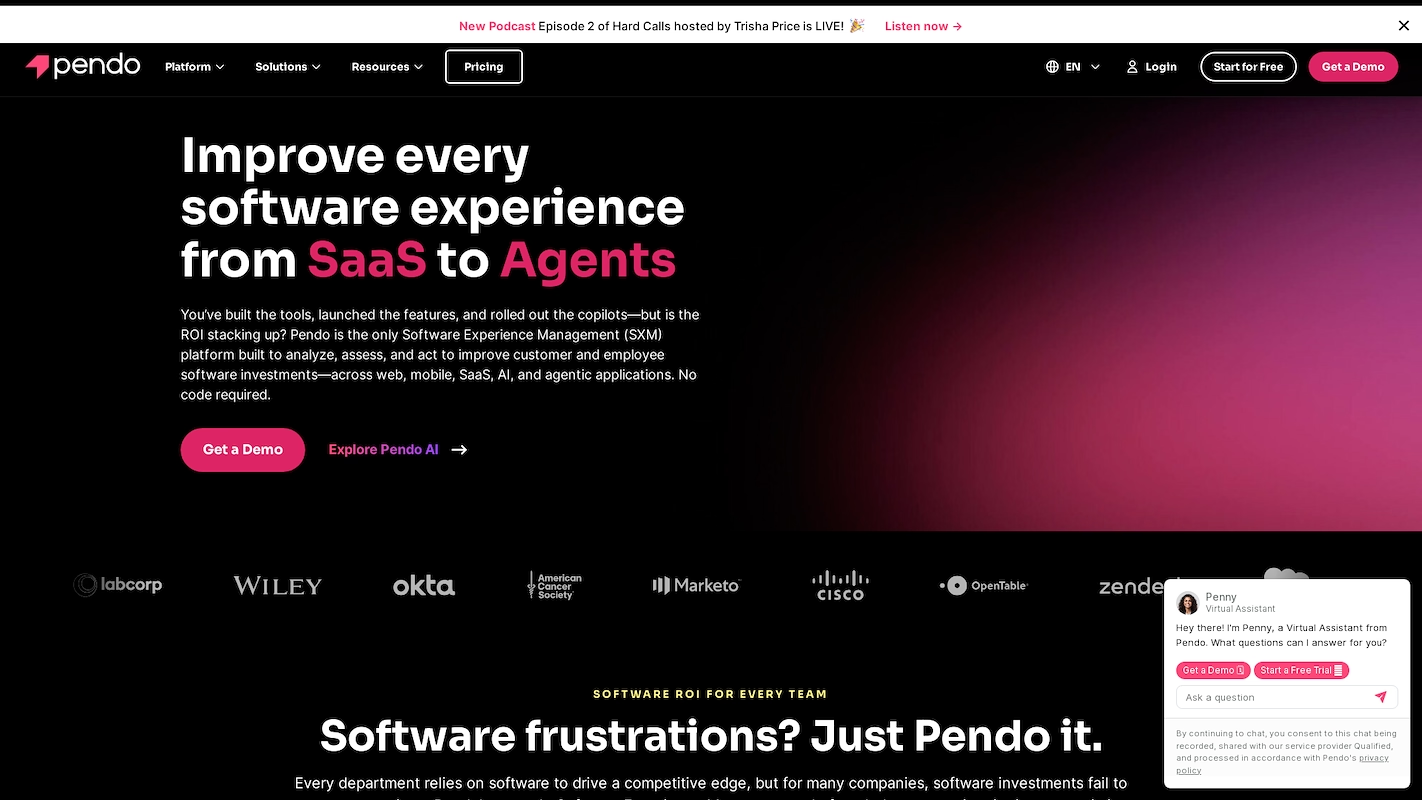
Pendo is a product experience platform. It offers analytics and in-app guides to show how people use a product. This helps companies improve adoption and make choices about new features or user support.
The software finds where users have trouble and offers help inside the app. This can lead to better user retention and help a company meet its growth targets.
Pendo's Main Features
- Tracks user sessions as part of its digital analytics metrics.
- Monitors user engagement using standard event tracking.
- Offers both real-time and retroactive reporting on user data.
- Includes user, role, and access management for administrative control.
How Pendo Compares to Lantern
Average Review Score: 4.4/5 stars based on 1,501 G2 reviews.
- Pendo provides in-app guides to help users learn a product. This is a user engagement feature that Lantern's web development service does not include.
- The tool analyzes user behavior with standard event tracking. This offers product usage insights, while Lantern focuses on the website's technical build and maintenance.
- It collects user feedback through polls and surveys inside the application. Lantern is a service for website creation and does not have a tool to gather user sentiment.
- The platform offers real-time and retroactive reporting on user data. This differs from Lantern, which focuses on the website build rather than ongoing data analysis.
Potential Drawbacks Compared to Lantern
- Pendo is a software platform for product analytics and does not include website creation. This contrasts with Lantern, which functions as a service partner to build a site from the ground up.
- It operates as a self-service tool, which can present a learning curve for some teams. This model does not include the dedicated project support and hands-on technical maintenance that Lantern provides.
- The tool provides data to guide product improvements but does not implement the changes. This is different from Lantern's service, which includes the direct technical work on a client's website.
Pricing and Cost-Effectiveness
Lantern provides custom quotes for its project-based services, while Pendo offers a free plan with custom pricing for its paid tiers. Lantern's model may suit a one-time website build, whereas Pendo is for ongoing product analysis. For details, visit Pendo's website.
Which One Should You Go With?
Choosing a Lantern alternative depends on your specific business needs and budget. This guide analyzed several options to inform your decision and help you find a suitable service for your goals.
For companies focused on sales automation, 11x is a relevant option. Its autonomous agents handle prospecting and lead qualification, which helps teams scale outreach without adding headcount. This can support companies that want to expand their sales capabilities.




